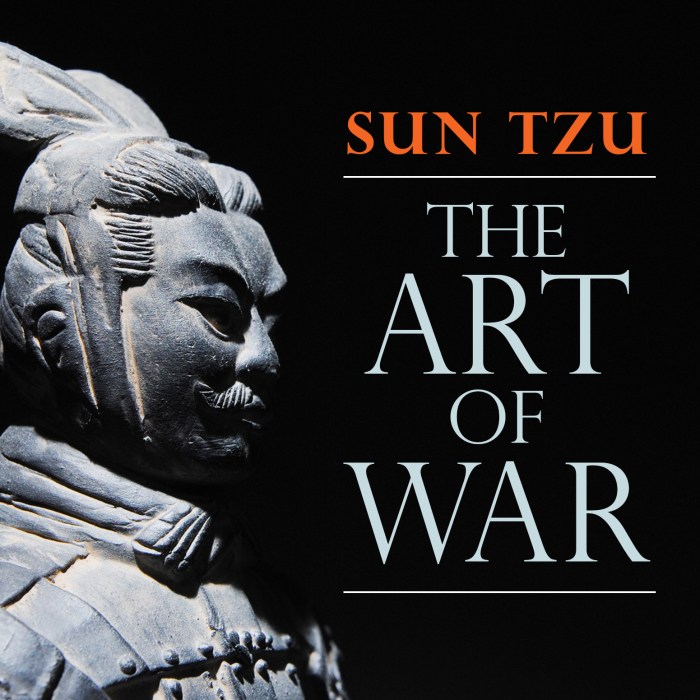Think you know the game? Think again! “The Art of War” isn’t just a dusty old book about battles and swords. It’s a timeless guide to strategy and success, applicable to everything from business deals to dating. Sun Tzu, the OG of strategy, drops knowledge bombs on how to outsmart your opponents, whether they’re a competitor or a Tinder date.
Get ready to dive into the world of ancient wisdom, where the stakes are high and the rewards are even higher.
Sun Tzu, a master strategist and military general, wrote “The Art of War” centuries ago, but his ideas are still relevant today. He understood the human condition, the power of deception, and the importance of knowing your enemy and yourself.
Whether you’re a CEO, a politician, or just trying to navigate the social jungle, “The Art of War” offers timeless wisdom to help you achieve victory.
Historical Context and Author
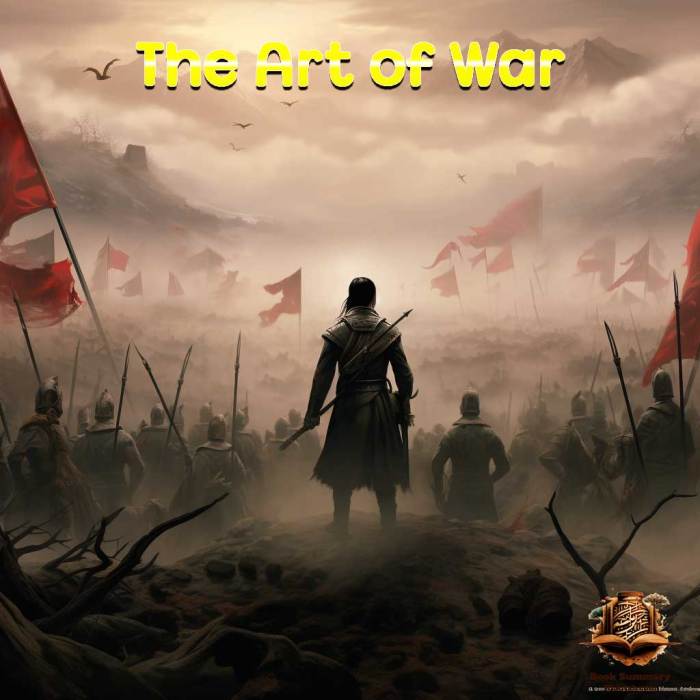
Sun Tzu, the legendary author of “The Art of War,” was a figure shrouded in mystery. While his real name and historical existence have been debated, his work stands as a timeless masterpiece of military strategy. It’s believed that he lived during the second half of the 6th century BC, a time of great political and social upheaval in ancient China.
Sun Tzu’s Life and Era
The Spring and Autumn period, a time of intense political fragmentation and warfare, provided the backdrop for Sun Tzu’s life. During this era, numerous small states battled for dominance, leading to constant conflict and the rise of powerful military figures.
Sun Tzu’s views on warfare were shaped by this turbulent environment, where strategic thinking was paramount for survival.
Cultural and Political Influences
The cultural and political landscape of ancient China heavily influenced Sun Tzu’s philosophy. Confucianism, with its emphasis on moral principles and social order, likely played a role in his belief that warfare should be a last resort. However, the harsh realities of war, coupled with the constant threat of invasion, led him to prioritize pragmatism and effectiveness.
Sun Tzu’s Military Experience
While the extent of Sun Tzu’s military experience is debated, his writings suggest a deep understanding of warfare. Some scholars believe he served as a high-ranking military official, while others suggest he was a military strategist and advisor. Regardless of his exact role, Sun Tzu’s insights into battlefield tactics, troop deployment, and the psychology of warfare were unparalleled.
Audience and Purpose
“The Art of War” was primarily intended for rulers and military leaders. Sun Tzu aimed to provide them with the knowledge and tools to achieve victory in battle while minimizing casualties. He believed that by understanding the principles of war, leaders could effectively utilize their resources and achieve their objectives.
The book’s enduring relevance lies in its applicability to various fields beyond warfare, including business, politics, and personal relationships.
Key Concepts and Principles
Sun Tzu’sThe Art of War* is a timeless masterpiece of military strategy, filled with wisdom that transcends the battlefield and applies to a wide range of human endeavors. It’s not just about winning wars; it’s about achieving victory in any situation, whether it’s a business negotiation, a political campaign, or even a personal conflict.
Sun Tzu’s principles are based on a deep understanding of human nature, the dynamics of conflict, and the importance of preparation, deception, and adaptability.
Deception as a Key Strategy
Deception is one of the most important principles in Sun Tzu’sThe Art of War*. He emphasizes the importance of misleading your opponent about your intentions and capabilities, creating confusion and uncertainty. This can be achieved through a variety of tactics, such as feigned retreats, false attacks, and the use of spies.
By keeping your enemy guessing, you can gain a strategic advantage and exploit their weaknesses.
“All warfare is based on deception.”
Knowing Your Enemy and Yourself
Another fundamental principle is the importance of knowing your enemy and yourself. Sun Tzu stresses the need to thoroughly understand your opponent’s strengths and weaknesses, their strategies, and their likely course of action. Equally important is a clear understanding of your own strengths and weaknesses, your resources, and your limitations.
This self-awareness is crucial for making informed decisions and developing effective strategies.
“If you know the enemy and know yourself, you need not fear the result of a hundred battles. If you know yourself but not the enemy, for every victory gained you will also suffer a defeat. If you know neither the enemy nor yourself, you will succumb in every battle.”
The Five Elements: Water, Fire, Wood, Metal, and Earth
Sun Tzu’s philosophy also incorporates the concept of the five elements: water, fire, wood, metal, and earth. These elements represent different aspects of warfare and are used to illustrate the cyclical nature of conflict and the importance of understanding the strengths and weaknesses of each element.
For example, water can overcome fire, fire can overcome metal, metal can overcome wood, wood can overcome earth, and earth can overcome water. This understanding of the five elements can help you to choose the right strategy for a given situation and to anticipate your opponent’s moves.
Sun Tzu’s Approach Compared to Other Military Philosophies
Sun Tzu’s
- The Art of War* stands out from other military philosophies of the time, such as the
- Book of Five Rings* by Miyamoto Musashi, due to its emphasis on strategy, deception, and psychological warfare. While other philosophies focused on physical combat and martial arts, Sun Tzu’s approach emphasized the importance of understanding the human element and using intelligence and strategy to achieve victory.
His work also differs from later military thinkers like Clausewitz, who emphasized the importance of national interest and political goals in warfare. Sun Tzu’s focus was on the tactical and strategic aspects of combat, and his principles are still relevant today, even in non-military contexts.
Modern Applications
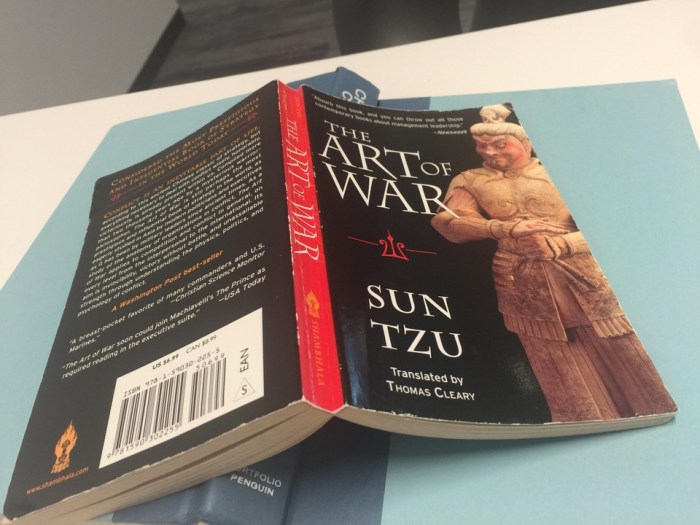
Sun Tzu’s timeless wisdom, originally crafted for the battlefield, has proven surprisingly adaptable to the modern world. His principles, focused on strategy, deception, and understanding your opponent, can be applied to various fields, from business negotiations to personal relationships.
Applications in Business
Sun Tzu’s strategies can be a powerful tool for navigating the competitive landscape of modern business.
- Know Your Enemy and Yourself:Before launching a new product or service, thoroughly research your competitors and understand their strengths and weaknesses. Equally important is knowing your own company’s capabilities and limitations. This allows you to leverage your strengths and capitalize on your competitors’ weaknesses.
- Strategic Planning:Sun Tzu emphasizes the importance of a well-defined strategy, outlining clear goals and objectives. In business, this translates to having a well-structured business plan that Artikels the company’s vision, target market, and marketing strategies. This plan should be flexible and adaptable to changing market conditions, just as a military commander adapts to unexpected developments on the battlefield.
- The Importance of Deception:Sun Tzu famously advocates for the use of deception to gain an advantage. In business, this could mean strategically misdirecting competitors about your intentions or using marketing campaigns to create a perception of superiority or scarcity.
- Avoiding Direct Confrontation:Sun Tzu emphasizes the importance of choosing your battles wisely. In business, this translates to avoiding unnecessary conflicts and instead focusing on finding mutually beneficial solutions through negotiation and collaboration.
Applications in Politics
Sun Tzu’s principles can be applied to political campaigns and negotiations, helping candidates and policymakers navigate the complex world of political maneuvering.
The Art of War is a classic for a reason, dude. It’s all about strategy and knowing your enemy, like a chess match on a battlefield. And speaking of strategy, you gotta check out this book, Fascinating Facts for Inquisitive Minds 1587 Mind-Boggling Facts About Science History Pop Culture & Beyond! Fun & Interesting Trivia Book For Curious People.
It’s packed with mind-blowing facts that’ll make you feel like a total boss in any trivia game. Anyway, back to The Art of War, it’s not just about battles, it’s about planning and knowing your own strengths and weaknesses. You gotta be like a ninja, stealthy and prepared, right?
- Understanding the Political Landscape:Just as a general needs to understand the terrain and the enemy’s movements, politicians must understand the political landscape, public opinion, and the motivations of their opponents. This allows them to craft strategies that resonate with voters and effectively counter their opponents’ arguments.
- Strategic Communication:Sun Tzu emphasizes the importance of clear and effective communication. In politics, this means delivering concise and persuasive messages that resonate with the target audience. Politicians must also be adept at managing public perception and using media to their advantage.
- Building Alliances:Sun Tzu stresses the importance of forming alliances. In politics, this translates to building coalitions and securing support from various groups and individuals. This can be crucial for passing legislation, winning elections, or influencing policy decisions.
Applications in Personal Life
Sun Tzu’s principles can be applied to personal life, helping individuals navigate relationships, achieve goals, and overcome challenges.
- Understanding People:Sun Tzu’s emphasis on understanding your opponent applies to personal relationships as well. By observing people’s behavior and motivations, you can better understand their needs and desires, fostering stronger connections.
- Goal Setting:Sun Tzu’s focus on strategic planning can be applied to personal goals. By setting clear objectives and developing a plan of action, you can increase your chances of achieving success.
- Conflict Resolution:Sun Tzu’s emphasis on avoiding unnecessary confrontation can be applied to personal conflicts. By choosing your battles wisely and seeking mutually beneficial solutions, you can minimize conflict and maintain healthy relationships.
Book Review
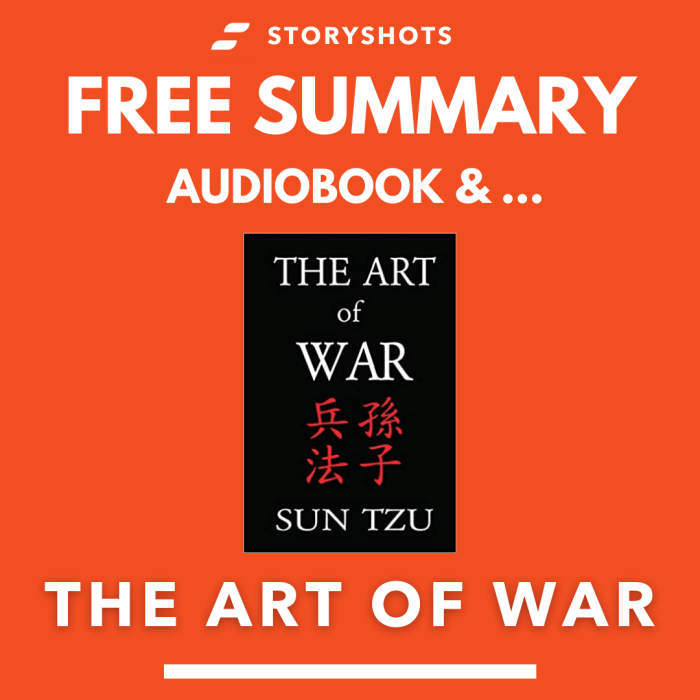
“The Art of War” by Sun Tzu is a timeless classic that has influenced military strategy for centuries. This ancient Chinese text offers a comprehensive guide to warfare, emphasizing the importance of planning, deception, and understanding both your own strengths and your enemy’s weaknesses.
While its origins lie in ancient China, its principles have proven remarkably relevant across cultures and throughout history, influencing military leaders and strategists alike.
Sun Tzu’s “The Art of War” is all about strategy, right? Like, knowing your enemy and yourself, and using that knowledge to win. It’s kinda like Raskolnikov in “Crime and Punishment (Vintage Classics)” Crime and Punishment (Vintage Classics) – he thought he was smarter than everyone else, but he didn’t really understand the consequences of his actions.
Maybe if he’d read “The Art of War” he’d have had a different outcome, ya know? Anyways, the point is, strategy is key, whether you’re planning a battle or a crime.
Strengths and Weaknesses
“The Art of War” is a remarkable text for its insightful and practical advice. Sun Tzu’s emphasis on planning and preparation, understanding your enemy, and choosing the right battles are timeless principles that remain relevant in modern warfare. The book’s focus on deception and psychological warfare is particularly striking, highlighting the importance of manipulating the enemy’s perceptions to gain an advantage.
However, the text also has its limitations. Its focus on large-scale warfare may not be as applicable to modern conflicts, which often involve smaller-scale operations and asymmetric warfare. Additionally, the book’s emphasis on deception and manipulation can be interpreted as advocating for unethical tactics, raising concerns about its potential misuse.
Impact on Military Thought
“The Art of War” has had a profound impact on military thought, influencing the strategies of countless military leaders throughout history. Its principles have been applied in various contexts, from ancient China to modern warfare. The book’s emphasis on planning, deception, and understanding the enemy has shaped the development of military doctrine and strategy.
For example, the use of camouflage and deception in modern warfare can be traced back to the principles Artikeld in “The Art of War.”
Literary Style and Accessibility
“The Art of War” is written in a concise and poetic style, using metaphors and parables to convey complex ideas. While this style can be challenging for modern readers, it also adds to the text’s enduring appeal. The book’s brevity and focus on practical advice make it accessible to a wide audience, regardless of their military background.
Sun Tzu’s “The Art of War” is all about strategy, right? Knowing your enemy, playing your cards right, and all that jazz. Well, you can bet Jerry Lee Lewis knew how to play the game, and you can check out his whole wild ride in Jerry Lee Lewis A Life from Beginning to End (Biographies of Musicians).
Maybe Lewis didn’t exactly follow Sun Tzu’s rules, but he definitely had his own brand of “strategic” moves. He was a force of nature, and his story is a real rollercoaster of highs and lows.
Its enduring popularity is a testament to its timeless wisdom and its ability to resonate with readers across cultures and generations.
Comparison with Other Influential Military Texts
“The Art of War” is often compared to other influential military texts, such as Clausewitz’s “On War” and Machiavelli’s “The Prince.” While all three texts offer valuable insights into warfare, they differ in their focus and approach. “On War” emphasizes the political and social dimensions of warfare, while “The Prince” focuses on the individual’s role in power politics.
“The Art of War,” on the other hand, provides a more practical and strategic guide to warfare, emphasizing the importance of planning, deception, and understanding the enemy.
End of Discussion
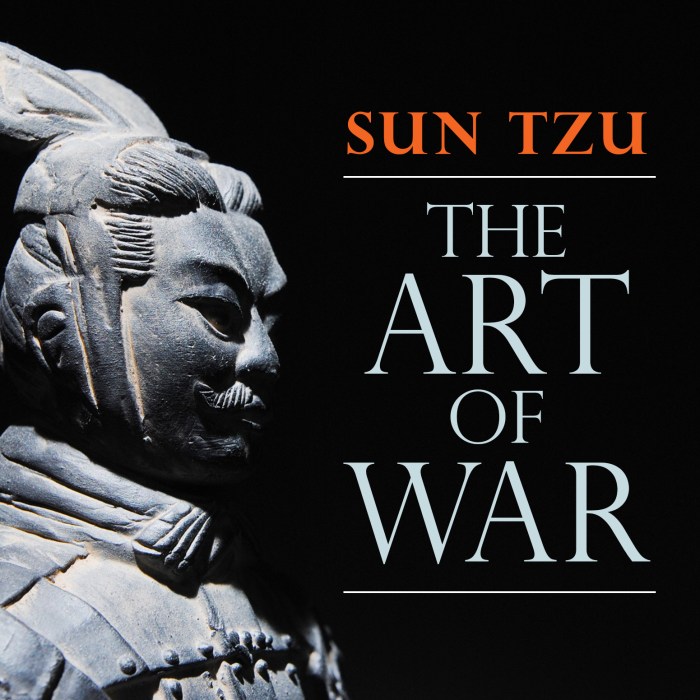
From the battlefield to the boardroom, “The Art of War” is a timeless guide to success. Sun Tzu’s strategies may have been developed centuries ago, but they’re still as relevant as ever. Whether you’re trying to land a big deal, win a debate, or simply navigate your personal life, “The Art of War” can give you the edge you need to achieve your goals.
So, grab a copy, study up, and get ready to conquer.
FAQ Guide
Is “The Art of War” really just about war?
Nope! While it was written as a guide to military strategy, the principles can be applied to many areas of life, from business to personal relationships.
Is “The Art of War” difficult to read?
Not at all! It’s surprisingly accessible and engaging. There are many different translations available, so you can find one that suits your reading style.
What are some of the most important principles in “The Art of War”?
Some of the key principles include knowing your enemy and yourself, deception, and the importance of planning and preparation. But the most important principle is probably “adaptability,” the ability to adjust your strategy based on changing circumstances.

